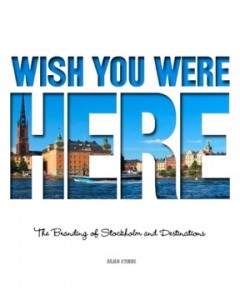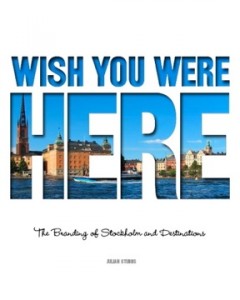 To get a free chapter of WISH YOU WERE HERE click this link:
http://page.upthereeverywhere.com/destinations-marketing-book-chapter?utm_referrer=http%3A%2F%2Fwww.upthereeverywhere.com%2Fup-for-real%2F
To get a free chapter of WISH YOU WERE HERE click this link:
http://page.upthereeverywhere.com/destinations-marketing-book-chapter?utm_referrer=http%3A%2F%2Fwww.upthereeverywhere.com%2Fup-for-real%2F
Cool Ideas in Place Branding and Place Marketing
- Sep 21, 2014
- Written by Julian Stubbs
- 0 Comments
 To get a free chapter of WISH YOU WERE HERE click this link:
http://page.upthereeverywhere.com/destinations-marketing-book-chapter?utm_referrer=http%3A%2F%2Fwww.upthereeverywhere.com%2Fup-for-real%2F
To get a free chapter of WISH YOU WERE HERE click this link:
http://page.upthereeverywhere.com/destinations-marketing-book-chapter?utm_referrer=http%3A%2F%2Fwww.upthereeverywhere.com%2Fup-for-real%2F
Attending INBOUND 14 in Boston
- Sep 15, 2014
- Written by Julian Stubbs
- 0 Comments

Scotland The Brave & Little Britain
- Sep 11, 2014
- Written by Julian Stubbs
- 0 Comments
Why I hope the the Scots vote aye next Thursday for an independent Scotland
The Scots go to the polls next Thursday September 18th to decide whether or not they should break free as an independent country. It seems to be only just dawning on the governing Westminster elite in London that they might actually decide to leave. The political establishment are now in panic, even rolling out some of the old guard politicians to persuade the Scottish voters to stay with the union. Senior civil service officials admit they have no plan of action should Scotland decide to go it alone. It appears they never took the Scottish referendum seriously and that this is for real.
In looking at the arguments of both camps, and having spent a few hours talking with a friend who is staunchly in favour of independence, I’ve come to a decision I didn’t thick I would. I’m with the yes camp (yes for independence).
I’m almost shocked myself at my own decision, but there’s three things that have struck me particularly in the debate that have helped my reasoning.
Firstly, the no camp are trying it on with the worst scare tactics going. They are claiming Scotland will face a stark future if they decide to go it alone. They’ll be a currency crisis, the economy will collapse. Education and the health service would suffer. As one person kindly pointed out on one of my other blog sites, fifty years ago this month Malta took the decision to go it alone, and become independent, despite similar predictions of doom and gloom. So Scotland’s not too small. I happen to live in Sweden, one of the smaller European countries, which does pretty well, as do our neighbours Norway and Denmark.
Secondly, the ‘Yes’ camp are keen Europeans, unlike their neighbours further south. If I ever returned to live in blighty (as we Brits fondly refer to the British Isles), I’d really struggle with this issue – in fact even more than the rubbish plumbing. I’m British, and proud of it, but I’m also a European and very proud of that too. Shock horror I’m even a fan of the Euro. It allows me to travel across Europe (most of it) without having to pay some bank to change my currency each time I cross a border and I can easily compare prices across European borders as they (mostly) have the same currency. I actually hope Scotland ditches the pound if they win, and adopts the euro.
Thirdly, and the most important reason for me personally, I think Britain (and when I say Britain, I mean England and when I say England that actually means just London) needs a damn good shake up. Britain is still in a hang-over from its empire days and still uses its colonial past as its normal reference point when considering the rest of the world and its relationship to it. In fact Britain has one almighty identity crisis. For the average Brit, Europe is another place. I’m not really sure what the plan is if the UK ever decided to leave Europe, which might just happen with political parties like UKIP snapping at the heels of the conservatives over the EU and pushing to withdraw. Maybe Britain intends to become the 51st State of the US (or Airstrip One). I fear for Britain greatly unless it moves on and defines a new future and lets go of the past.
As part of redefining itself, more power should be devolved across the UK. Cities like Liverpool, Manchester, Newcastle and Cardiff should become new powerhouses of commerce. Infrastructure needs to be modernised to ease travel and communications and a whole host of strategic changes made to Britain’s game plan to face a new future.
If the Scots do vote yes then expect some major implications. Who would be next? Wales, Northern Ireland? Yorkshire?
If the Scots do vote yes next Thursday it will be a case of Scotland the brave and potentially the start of Little Britain.
Join my City Brands group on Linked In.
Do read Jamie Jaunceys excellent blog A Few Kind Words on the referendum issue.
afewkindwords.me
Inbound. Digital Week in Boston
- Sep 10, 2014
- Written by Julian Stubbs
- 0 Comments

This way UP
- Jul 2, 2014
- Written by Julian Stubbs
- 0 Comments
Norway. Not as boring as BA
- Jun 24, 2014
- Written by Julian Stubbs
- 0 Comments
Bored on a long haul flight? Well watch a Norwegian train journey (alternatively you could just take a Norwegian train journey in the first place). BA are introducing films of a Norwegian train journey for passengers to pass the time.
See Wired Magazine. http://www.wired.co.uk/news/archive/2014-06/23/british-airways-norway-train-film
E-Ployment. Living and Working in the Cloud in the 21st Century
- Nov 27, 2013
- Written by Julian Stubbs
- 0 Comments
Place Branding: July 4th, 2013. And I am in Amsterdam I am.
- Jul 8, 2013
- Written by Julian Stubbs
- 0 Comments
Place Branding. Copenhagen is losing out to Stockholm. And now they have another problem…
- Jun 3, 2013
- Written by Julian Stubbs
- 0 Comments
Place Branding: Liverpool. City on the UP
- May 23, 2013
- Written by Julian Stubbs
- 0 Comments
 However, in the last seventy or so years, Liverpool has seen difficult times. Being heavily bombed in the second world war and then devastated by recession during the 1970s, has made it a city with true grit. The city has refocused itself in recent years, making significant investments in a massive urban renewal programme. In 2008 the city was rewarded by being named European Capital of Culture. Walk the streets of the city and you realise Liverpool still has a way to go but it is now heading in a confident new direction.
Liverpool is part of a wider region called Merseyside and according to Liverpool Vision, the organisation behind the Liverpool 2008 brand, there has always been confusion when talking to external and international audiences about Merseyside. Liverpool Vision recognised the strength they had in the city of Liverpool and developed it as an attack brand to help market the whole region. Liverpool did not have its own strong brand identity up to that point. However being Capital of Culture gave it an opportunity to create a new brand for that year. There was a need to ensure that the positive work the region had started, was then continued after the year as Capital of Culture, so new branding work was required.
Stakeholder driven
The city saw stakeholder involvement as a key part of their work. Liverpool already had an influential group called Liverpool First a group of important stakeholders consisting of major businesses, governmental organisations, public sector agencies, as well as representatives from voluntary and community groups. These groups all worked together to discuss important issues about the area. It was Liverpool First who commissioned Liverpool Vision to develop the new brand. Therefore stakeholder engagement was already achieved.
Leveraging the citys strength
Research established that the city had an impressive number of icons to leverage in developing the citys new brand identity. As well as worldwide strengths associated with The Beatles and football, Liverpool is recognised as a city on the up.
Extensive regeneration projects combined with warm welcoming people and a unique waterfront, helps it to stand out over other northern UK cities and destinations. A new brand logotype was developed along with launch events and a new web site, all of which were supported by a media campaign and extensive PR work that encouraged local businesses to use the new brand image in their own advertising.
Its still early days for the Liverpool brand, but the city has already seen success in companies working with their new identity and downloading it from their website. The question is now what comes next. Brands are about more than just logotypes and Liverpool has to re-asses its role not just in a northern UK cities context, or even a UK one, but more importantly as a world class city.
I believe Liverpool is a city on the UP, and I think it’s best days are yet to come.
Check out the Liverpool brand at:
www.itsliverpool.com
This blog is mostly reproduced from Wish You Were Here the first book on Place and Destination branding by Julian Stubbs. Wish You Were Here Too will be out in Spring 2014.
However, in the last seventy or so years, Liverpool has seen difficult times. Being heavily bombed in the second world war and then devastated by recession during the 1970s, has made it a city with true grit. The city has refocused itself in recent years, making significant investments in a massive urban renewal programme. In 2008 the city was rewarded by being named European Capital of Culture. Walk the streets of the city and you realise Liverpool still has a way to go but it is now heading in a confident new direction.
Liverpool is part of a wider region called Merseyside and according to Liverpool Vision, the organisation behind the Liverpool 2008 brand, there has always been confusion when talking to external and international audiences about Merseyside. Liverpool Vision recognised the strength they had in the city of Liverpool and developed it as an attack brand to help market the whole region. Liverpool did not have its own strong brand identity up to that point. However being Capital of Culture gave it an opportunity to create a new brand for that year. There was a need to ensure that the positive work the region had started, was then continued after the year as Capital of Culture, so new branding work was required.
Stakeholder driven
The city saw stakeholder involvement as a key part of their work. Liverpool already had an influential group called Liverpool First a group of important stakeholders consisting of major businesses, governmental organisations, public sector agencies, as well as representatives from voluntary and community groups. These groups all worked together to discuss important issues about the area. It was Liverpool First who commissioned Liverpool Vision to develop the new brand. Therefore stakeholder engagement was already achieved.
Leveraging the citys strength
Research established that the city had an impressive number of icons to leverage in developing the citys new brand identity. As well as worldwide strengths associated with The Beatles and football, Liverpool is recognised as a city on the up.
Extensive regeneration projects combined with warm welcoming people and a unique waterfront, helps it to stand out over other northern UK cities and destinations. A new brand logotype was developed along with launch events and a new web site, all of which were supported by a media campaign and extensive PR work that encouraged local businesses to use the new brand image in their own advertising.
Its still early days for the Liverpool brand, but the city has already seen success in companies working with their new identity and downloading it from their website. The question is now what comes next. Brands are about more than just logotypes and Liverpool has to re-asses its role not just in a northern UK cities context, or even a UK one, but more importantly as a world class city.
I believe Liverpool is a city on the UP, and I think it’s best days are yet to come.
Check out the Liverpool brand at:
www.itsliverpool.com
This blog is mostly reproduced from Wish You Were Here the first book on Place and Destination branding by Julian Stubbs. Wish You Were Here Too will be out in Spring 2014.
 Wish You Were Here on Amazon:
http://www.amazon.com/Wish-You-Were-Here-Destinations/dp/1456414232/ref=sr_1_1?ie=UTF8&qid=1370060366&sr=8-1&keywords=julian+stubbs
Wish You Were Here on Amazon:
http://www.amazon.com/Wish-You-Were-Here-Destinations/dp/1456414232/ref=sr_1_1?ie=UTF8&qid=1370060366&sr=8-1&keywords=julian+stubbs


